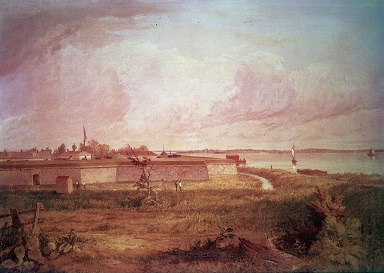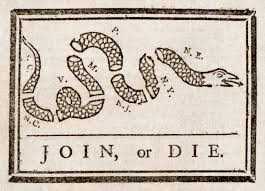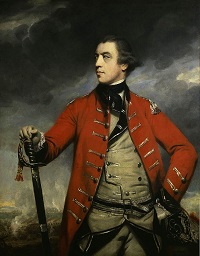The Siege of Fort Mifflin
Life During Wartime

Seth Eastman, 1781
The artist was a retired General in the U.S. Army, commisioned by Congress to create a series of paintings of American forts.
After being thwarted at the Battle of Germantown on October 4, 1777, the Continental Army fell back to defend the supply cities of the western Pennsylvania, notably Reading. Much of the victorious British army remained in Germantown, five miles north of Philadelphia. The rest of the British, including many officers, quartered in Philadelphia which had been taken on September 26th. But on October 19, a nervous General Howe, fearing for his supply lines and feeling vulnerable to another attack, recalled several thousand British troops from Germantown into Philadelphia proper.
So Philadelphia, already the most populous city in the colonies, was now swelled in size by a British army which numbered about 18,000 or so. With these troops came the usual camp followers — wives, prostitutes, and sutlers. And while many supporters of the Revolution had fled Philadelphia in late September upon word that the British were coming, their place was quickly filled up by a legion of Loyalists. Many of these Loyalists had left Philadelphia earlier in the summer because of an unfavorable political climate.
Adding to this throng was a host of New Yorkers who flocked to Philadelphia eying the wartime business prospects. With a good many of Philadelphia's merchants having fled the city, there would be need for new sellers to take their place.
A Hungry City
The city was packed and rooms were hard to find. Moreover, all these people had to be fed and supplied. And Howe had a huge problem — he could not get supplies into Philadelphia.
Washington's army controlled the area to the west and north of Philadelphia; the area south of the city was already denuded and pillaged by Howe's overland march to get into Philadelphia; New Jersey to the east was hostile to Howe and the general's supply trains would be unprotected against attack by the state militia.
Most importantly, the Delaware River, the channel by which supplies could be brought in from England and other parts of the colonies, was in the hands of Washington's troops. Washington, recognizing Howe's dilemma, observed:
If the river defenses can be maintained, General Howe's situation will not be the most agreeable; for if his supplies can be stopped by water, it may easily be done by land...The acquisition of Philadelphia may, instead of his good fortune, prove his ruin.
Howe recognized that the only sensible way to supply the surrounded city was via the Delaware River. The Americans, however, controlled three forts in and along the river which the British would have to conquer so that their ships hauling supplies could pass safely. To reach these forts, British ships would first have to navigate past cheveaux-de-frise, a weapon consisting of sharpened spikes hidden in the river with the capability of ripping holes in hulls.
The Pennsylvania Navy
Further, the British would have to contend with the mosquitolike Pennsylvania Navy patrolling the Delaware. The 48 boats and ships of the state navy were lilliputian compared to the massive hulks of the British navy. Yet, mosquitoes have been known to raise welts on much larger beasts — as Howe would soon appreciate.
The two southernmost of the Americans forts, Billingsport and Fort Mercer were on the New Jersey side of the Delaware River. On the Pennsylvania side of the river, 1,900 yards to the north of Fort Mercer, was Fort Mifflin — the focal point of the American river defense. The British needed to vanquish these forts to get supplies into Philadelphia.
Toward that end, the British sent heavily cannoned warships toward the forts, plans were made to attack Fort Mercer by land, and British batteries were being prepared to bombard Fort Mifflin.
In the interim, a large portion of the British flotilla that had landed at the Head of the Elk River six weeks earlier now lay at anchor off of Chester, Pennsylvania. These supply-laden ships could bring desperately needed food into nearby Philadelphia — if only the river was cleared of obstructions.
Time was now the biggest foe of the British. News of the General Burgoyne's defeat at the hands of American troops under General Gates had reached the British in Philadelphia. Major Serle wrote, "This is the most fatal Blow we have yet felt, and will I fear occasion every sort of Chagrin & Uneasiness at Home. GOD save & bless my King & Country from the wicked Conspiracies off all their enemies!"
Howe recognized that the taking of the forts would provide a big morale boost not only to his own soldiers, but to the folks back in England. More importantly, he would be able to get supplies into the city. But as October waned, Howe grew impatient. Neither his army nor navy was able to make any headway in clearing the river.
For a first-hand account, read selections from Joseph Plumb Martin's diary.
Then there was ice.
If the Delaware River froze, British ships would not be able to reach Philadelphia. And it was already unseasonably cold for October. Ice could already be seen along the shoreline. If the city could not be supplied, the British would have to consider making an ignominious retreat from Philadelphia.
In the meantime, criticisms from the caustic Howe began to rankle his officers. Howe grew increasingly frustrated at the failure of combined efforts of his army and navy to conquer the river forts. His officers responded by griping at Howe behind his back and questioning his leadership at Germantown. The British were showing strain from an unsuccessful campaign.
The Americans defending Fort Mifflin would thus frustrate Howe for almost two full months. The British began their siege on the fort on September 26, and it held out until November 16, when it finally fell to the British,




